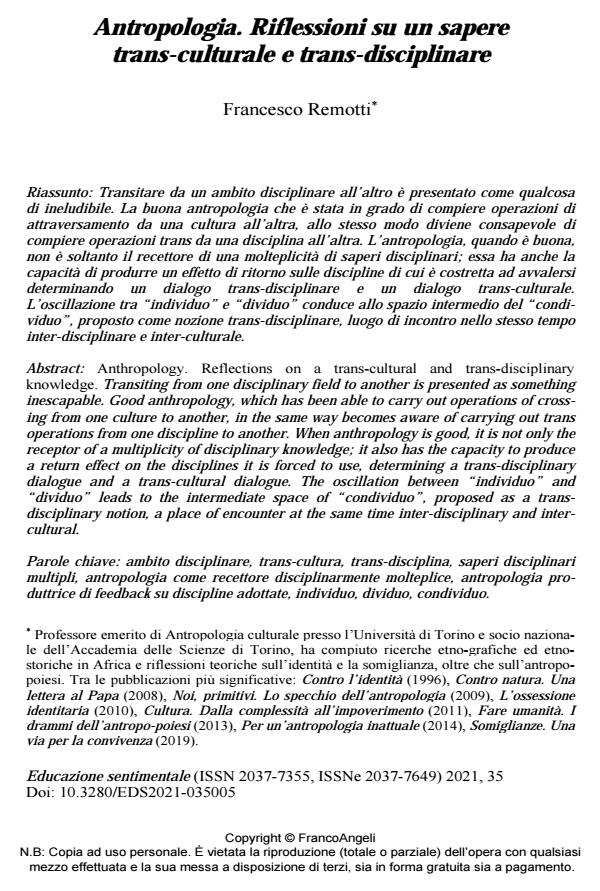Anthropology. Reflections on a trans-cultural and trans-disciplinary knowledge.
Journal title EDUCAZIONE SENTIMENTALE
Author/s Francesco Remotti
Publishing Year 2021 Issue 2021/35 Language Italian
Pages 7 P. 72-78 File size 165 KB
DOI 10.3280/EDS2021-035005
DOI is like a bar code for intellectual property: to have more infomation
click here
Below, you can see the article first page
If you want to buy this article in PDF format, you can do it, following the instructions to buy download credits

FrancoAngeli is member of Publishers International Linking Association, Inc (PILA), a not-for-profit association which run the CrossRef service enabling links to and from online scholarly content.
Transiting from one disciplinary field to another is presented as something ines-capable. Good anthropology, which has been able to carry out operations of crossing from one culture to another, in the same way becomes aware of carrying out trans operations from one discipline to another. When anthropology is good, it is not only the receptor of a multiplicity of disciplinary knowledge; it also has the capacity to produce a return effect on the disciplines it is forced to use, de-termining a trans-disciplinary dialogue and a transcultural dialogue. The oscil-lation between "individuo" and "dividuo" leads to the intermediate space of "condividuo", proposed as a trans-disciplinary notion, a place of encounter at the same time inter-disciplinary and inter-cultural.
Keywords: disciplinary scope, trans-culture, trans-discipline, multiple disciplinary knowledge, anthropology as a disciplinarily multiple receptor, anthropology producing feedback on adopted disciplines, individuo, dividuo, condividuo
- Remotti F. (2013). L’imperfezionamento in antropologia. In: W. Kaltenbacher, a cura di, Simposio Lévi-Strauss. Uno sguardo dall’oggi. Milano: Il Saggiatore, pp. 57-94.
- Remotti F. (2014). Per un’antropologia inattuale. Milano: Elèuthera.
- Remotti F. (2019). Somiglianze. Una via per la convivenza. Roma-Bari: Laterza.
- Gagliasso E. (2009). La metafora di individuo in biologia. Paradigmi. Rivista di critica filosofica, XXVII(1): 137-146. DOI: 10.3280/PARA2009-001010
- Gilbert S.F., Sapp J., Tauber A.I. (2012). A Symbiotic View of Life: We Have Never Been Individuals. The Quarterly Review of Biology, LXXXVII(4): 325-341. DOI: 10.1086/668166
- Kuhn T. (1969). La struttura delle rivoluzioni scientifiche. Torino: Einaudi. Ediz. originale: The structure of scientific revolutions. Chicago: The University of Chicago Press, 1962.
- Margulis L. (1998). Symbiotic Planet: A New Look at Evolution. New York: Basic Books.
- Mauss M. (2002). Il saggio sul dono. Torino: Einaudi (ed. or. 1924-1925).
- Monti M., Redi C.A. (2018). Noi siamo l’intestino. La Lettura (Corriere della Sera), 8 aprile, pp. 2-3.
- Monti M., Redi C.A., a cura di (2019). CON-dividuo. Cellule e genomi. Pavia: Collegio Ghislieri, Ibis.
- Remotti F., a cura di (1997). Le antropologie degli altri. Saggi di etno-antropologia. Torino: Paravia-Scriptorium.
Francesco Remotti, Antropologia. Riflessioni su un sapere trans-culturale e trans-disciplinare in "EDUCAZIONE SENTIMENTALE" 35/2021, pp 72-78, DOI: 10.3280/EDS2021-035005